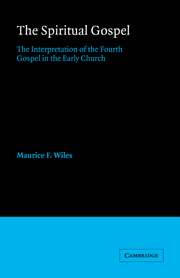Book contents
- Frontmatter
- Contents
- ACKNOWLEDGEMENTS
- ABBREVIATIONS
- INTRODUCTION Commentaries and commentators
- I The authorship and purpose of the Gospel
- II The Fourth Gospel and the Synoptic Gospels
- III Historicity and symbolism
- IV The signs
- V Leading ideas of the Gospel
- VI The Fourth Gospel and the Gnostics
- VII Christological interpretation in the third and fourth centuries
- VIII The Christological exegesis of Theodore and Cyril
- IX The Gospel of salvation
- EPILOGUE An assessment
- BIBLIOGRAPHY
- INDEX OF PROPER NAMES
- INDEX OF TEXTS
VI - The Fourth Gospel and the Gnostics
Published online by Cambridge University Press: 06 March 2010
- Frontmatter
- Contents
- ACKNOWLEDGEMENTS
- ABBREVIATIONS
- INTRODUCTION Commentaries and commentators
- I The authorship and purpose of the Gospel
- II The Fourth Gospel and the Synoptic Gospels
- III Historicity and symbolism
- IV The signs
- V Leading ideas of the Gospel
- VI The Fourth Gospel and the Gnostics
- VII Christological interpretation in the third and fourth centuries
- VIII The Christological exegesis of Theodore and Cyril
- IX The Gospel of salvation
- EPILOGUE An assessment
- BIBLIOGRAPHY
- INDEX OF PROPER NAMES
- INDEX OF TEXTS
Summary
Our earliest commentary on the Gospel comes, as we have seen, from the pen of Heracleon, a Valentinian Gnostic. This is no accident. At first the Gospel appears to have received a wider circulation amongst the Gnostics than amongst the orthodox. Before long, however, despite slight misgivings it was receiving an equally general acceptance among the orthodox as the final strand of the fourfold Gospel. It was, therefore, a natural battle ground for the struggle between Gnosticism and orthodoxy. Both sides accepted its authority, but interpreted it differently. An essential element, therefore, in the struggle with Gnosticism was the question of the right exegesis of the Gospel.
In this struggle Irenaeus was the principal contestant on the side of orthodoxy. A good deal of so-called Gnostic exegesis could be dismissed with comparative ease as not really exegesis at all. Irenaeus recounts Ptolemaeus' interpretation of the prologue as demonstrating the first Ogdoad in the Valentinian system—Pater, Charis, Monogenes, and Aletheia, Logos, Zoe, Anthropos and Ecclesia. To this Irenaeus can reply quite simply that if it were the author's intention to indicate this Ogdoad, he has set about it in a very surprising manner. The terms do not appear in anything like the order that they are supposed to hold in the Valentinian system, and in fact one of them, Ecclesia, does not figure in the passage at all. Moreover the interpretation appears to involve giving the word ‘Logos’ in v. 1 a different reference from that given to the same word in v. 143.
- Type
- Chapter
- Information
- The Spiritual GospelThe Interpretation of the Fourth Gospel in the Early Church, pp. 96 - 111Publisher: Cambridge University PressPrint publication year: 1960



